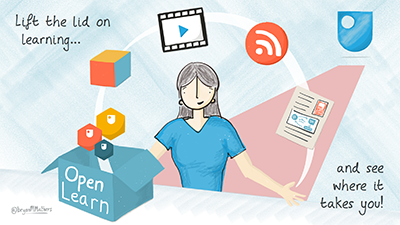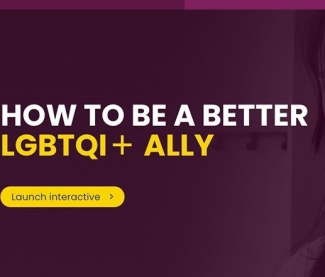 The sudden closure of universities and schools across the globe has created a demand in delivering educational content online. The Open University has long been a front-runner in distance learning, specifically online. Did you also know that we provide FREE content on OpenLearn, written by Open University academics? We offer a variety of FREE courses, interactives, academic insights and animations on a range of subjects.
The sudden closure of universities and schools across the globe has created a demand in delivering educational content online. The Open University has long been a front-runner in distance learning, specifically online. Did you also know that we provide FREE content on OpenLearn, written by Open University academics? We offer a variety of FREE courses, interactives, academic insights and animations on a range of subjects.
We also have some comprehensive courses to show you how to make your own open educational resources. Check out the courses below:
FREE courses on open educational resources
-
Creating open educational resources
Learn more to access more details of Creating open educational resourcesAre you interested in creating your own open educational resources? This free course, Creating open educational resources, will help you to write a learning course and provide you with links to various resources for open-learning materials. You will learn about the different purposes of self-instruction and receive advice about the techniques ...

Free course
15 hours
Level: 1 Introductory
-
An introduction to Open Educational Resources (OER)
Learn more to access more details of An introduction to Open Educational Resources (OER)In this free course, An introduction to Open Educational Resources (OER), you will look at some institutional OER initiatives. These will include MIT's open courseware, Carnegie Mellon's Open Learning Initiative and The Open University's OpenLearn. You will get a flavour of how different OER initiatives design and present the content for their ...

Free course
6 hours
Level: 3 Advanced
-
Open education
Learn more to access more details of Open educationThere are many different 'flavours' or interpretations of what openness means in education. This free course, Open education, is an example of a massive open online course (MOOC) and spans seven weeks. Like all the free materials on OpenLearn, this course is open to the wider world but, uniquely, it also forms part of the module for students who...

Free course
40 hours
Level: 3 Advanced
-
Networked practitioner: open or closed practice?
Learn more to access more details of Networked practitioner: open or closed practice?This free course, Networked practitioner: open or closed practice?, starts a debate to support the decision-making process around openness and the different preferences we each have.

Free course
4 hours
Level: 3 Advanced
How to make an open online course
Gain the skills and knowledge to design, structure and produce your own open online course. Head over to our sister site OpenLearn Create to get started with 'How to make an open online course'.
Take your training online
At the beginning of the Covid-19 pandemic, many charities and NGOs moved their training online, often at high speed. 'Take your training onine' aims to help practitioners improve the online training they developed at speed.
FREE materials on distance learning
-
Am I ready to be a distance learner?
Learn more to access more details of Am I ready to be a distance learner?Distance learning can open up opportunities for study. You might have not studied for a while, you might be returning to education, or you might not have had the chance to study at a higher level before. This free course, Am I ready to be a distance learner?, will help to boost your confidence. You'll explore useful skills so you can discover ...
-
Take your teaching online
Learn more to access more details of Take your teaching onlineIn this free course, Take your teaching online, you will gain knowledge fundamental to delivering effective teaching online. You will hear about the experiences of real educators, be introduced to cutting edge research, and understand the ideas and tools that shape how we teach and learn online. You will also learn useful methods that will ...

-
Teaching and learning tricky topics
Learn more to access more details of Teaching and learning tricky topicsThis free course is designed to provide a background and understanding of tricky topics, the practical application of threshold concepts, and their connection with learning design, digital innovation and learning analytics. The course, and the innovative teaching tricky topic process which it explores, will be useful for trainee or experienced ...

Don't forget accessibility!
What works in a classrooom or lecture theatre may not work online. Have an understanding of the types of technology used by disabled students and the challenges they face in this free course:
-
Accessibility of eLearning
Learn more to access more details of Accessibility of eLearningIt is part of a teaching professional's skills to understand the needs of a diverse population of students. This free course, Accessibility of eLearning, introduces the challenges for disabled students who may use computers in different ways when taking part in eLearning or may need alternative teaching methods. It covers the technology and ...

Free course
15 hours
Level: 3 Advanced
Still looking for inspiration?
Check out some examples of our most popular free courses, interactives and animations for inspiration on how to present your teaching online.
Our most popular FREE courses
-
MSE’s Academy of Money
Learn more to access more details of MSE’s Academy of MoneyThe Open University has joined forces with MoneySavingExpert (MSE) to give you the skills and knowledge to master your finances. Packed with videos, audios, quizzes and activities the course covers all the key aspects of personal finance in six sessions of study that each take around two hours to complete.

-
Understanding autism
Learn more to access more details of Understanding autismLearn about autism, one of the most challenging long-term conditions of the century. This free course, Understanding autism, introduces the autism spectrum, how it is experienced by individuals and families, and why it has become a global concern. The course explains how understanding of the autism spectrum and approaches to diagnosis and care ...

-
Supporting children's mental health and wellbeing
Learn more to access more details of Supporting children's mental health and wellbeingDo you have a professional or personal interest in the mental health issues affecting young children? Are you working with children or are you a parent or carer? This free course, Supporting children’s mental health and wellbeing, is designed to give insight into the factors that are contributing to our youngest citizens’ poor mental health; ...

-
Everyday maths 1
Learn more to access more details of Everyday maths 1This free course, Everyday maths 1, is designed to bring your learning to life, inspiring you to improve your current maths skills or helping you to remember any areas that you may have forgotten. Working through the examples and interactive activities in this course will help you to, among other things, run a household or make progress in your ...

-
Forensic psychology
Learn more to access more details of Forensic psychologyIn this free course, Forensic psychology, you will discover how psychology can help obtain evidence from eyewitnesses in police investigations and prevent miscarriages of justice.

-
Effective communication in the workplace
Learn more to access more details of Effective communication in the workplaceImprove your workplace relationships and boost your professional impact with this free course on effective communication. Discover how to express yourself clearly, understand others better, and adapt your communication skills for a range of situations, from everyday conversations to the digital workplaces of the future.

-
Introduction to cyber security: stay safe online
Learn more to access more details of Introduction to cyber security: stay safe onlineProtect your digital life with this free course introducing the essentials of cyber security. Learn how to spot online threats, keep your information safe and understand key topics like malware, network security and identity theft — helping you stay secure at home, at work, and beyond.

-
English: skills for learning
Learn more to access more details of English: skills for learningDevelop the English reading and writing skills needed for university success.

Our best games and interactives
-
Learning has never been so much fun
Take part now to access more details of Learning has never been so much funOur interactive and educational games are played and enjoyed by hundreds of thousands of visitors every year. We've pulled together 15 of our favourites for you to enjoy, so check out this collection - all for free and perfect for the home or the classroom... learning has never been so much fun!

-
No sex please, we're British!
Take part now to access more details of No sex please, we're British!There have been major changes in sexual attitudes over the years, but what are the views of the ‘average’ British person in terms of sex? Try our sexual attitudes interactive 'No sex please, we’re British!' to see how your views compare to the majority.

-
Putting the child before the player
Take part now to access more details of Putting the child before the playerFootball is the most popular team sport for children and young people in the UK and throughout much of the world. In this interactive, you will learn why children’s rights are fundamental to every young person’s experience of football.

-
Good hair: perceptions of racism
Take part now to access more details of Good hair: perceptions of racismHow does racism manifest itself in schools and workplaces? Explore the policies that discriminate against Black and Minority Ethnic communities in this immersive film interactive.

-
How To Be A Better LGBTQI+ Ally
Take part now to access more details of How To Be A Better LGBTQI+ AllySo you think you're supportive? But are you really an LGBTQI+ ally? Test yourself by using our immersive film-based interactive.

Our favourite videos and animations
-
Three Tort law cases you should know
Watch now to access more details of Three Tort law cases you should knowFrom issues with your neighbour activities to Katie Hopkins getting in to deep legal water on Twitter, check out the stories of three extraordinary torts in these short animations on law.

-
Social media - fake news, filter bubbles and sharing wisely!
Watch now to access more details of Social media - fake news, filter bubbles and sharing wisely!Meet Frank and travel with him on his adventures through the (sometimes foggy) realms of social media. Explore sharing, filter bubbles and fake news- maybe you can learn from Frank's mistakes with the help of Josie Long.

-
Five Equity, Trust and Land Law Cases You Should Know
Watch now to access more details of Five Equity, Trust and Land Law Cases You Should KnowFrom gagging a kiss and tell story to the issues around the statement 'finders keepers', take a look at some of these extraordinary animated law cases and why they matter.

-
Troy Story: Homer's Iliad and Odyssey
Watch now to access more details of Troy Story: Homer's Iliad and OdysseyInterested in Greek myths? We've condensed the epic narrative of Homer's poems the Iliad and the Odyssey into short animations voiced by the dulcet tones of Don Warrington.

-
Five reasons why you should care about mindfulness
Read now to access more details of Five reasons why you should care about mindfulnessMindfulness is about focusing on the present moment, whilst at the same time accepting your feelings, thoughts, and body’s sensations. But why does mindfulness matter?

-
Sperm counts
Read now to access more details of Sperm countsHow much sperm does a man make? Would you explode if you don't release your sperm? Explore the male reproductive system in this article and video.

-
From old English to modern English
Read now to access more details of From old English to modern EnglishAngles, Saxons, Jutes, Vikings - how did they impact the English language? Marisa Lohr traces the origins and development of the English language, from its early beginnings around 450 AD to the modern global language we use today.

-
A discussion on melanoma (skin cancer) as a teenager
Listen now to access more details of A discussion on melanoma (skin cancer) as a teenagerListen to three podcasts, with Jack Brodie and Dr Wendy McInally discussing young people aged 16 to 26 with melanoma (skin cancer).




Rate and Review
Rate this article
Review this article
Log into OpenLearn to leave reviews and join in the conversation.
Article reviews